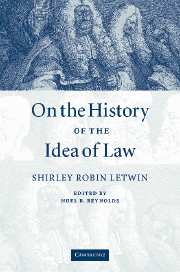Book contents
- Frontmatter
- Contents
- Editor's preface
- Introduction: The idea of law
- Part I Law anchored to a cosmic order
- Part II The Christian revision
- Part III The modern quest
- 6 Thomas Hobbes
- 7 John Locke
- 8 Immanuel Kant
- 9 Jeremy Bentham
- Part IV The significance of rules
- Part V The idea of law repudiated
- Part VI New foundations
- Index
9 - Jeremy Bentham
Published online by Cambridge University Press: 22 September 2009
- Frontmatter
- Contents
- Editor's preface
- Introduction: The idea of law
- Part I Law anchored to a cosmic order
- Part II The Christian revision
- Part III The modern quest
- 6 Thomas Hobbes
- 7 John Locke
- 8 Immanuel Kant
- 9 Jeremy Bentham
- Part IV The significance of rules
- Part V The idea of law repudiated
- Part VI New foundations
- Index
Summary
Although Bentham also tied the idea of law to a moral theory that does not rely on either revelation or transcendent metaphysics and had no use for the uncertainties of practical reasoning, his understanding of law could hardly be more unlike Kant's. Whereas Kant sought to preserve the moral character of law by divorcing it from the practical pursuit of satisfactions, Bentham made that pursuit the foundation of law. But neither his concerns nor his methods were simple. What we find in Bentham is a medley of five different and not altogether compatible views of law, which sets the pattern for the theories that became dominant in the twentieth century.
In textbooks Bentham is described as the father of the positivist philosophy of law, the view that law consists of rules whose validity can and should be distinguished from their desirability. And he is credited with or accused of believing that adjudication consists of interpreting established rules and that maintaining a fixed set of authenticated rules is the essence of the rule of law. This wholly traditional view of law appears in his criticism of common law.
There Bentham argues that the common law is defective because it does not consist of authentically recorded rules made by known legislators. There is an echo of ancient authors in Bentham's insistence that a rule of law can only be predicated on “some certain assemblage of words… It is words only that can be spoken of as binding: because it is words alone that are producible with certainty when occasion comes for any individual to be bound.”
- Type
- Chapter
- Information
- On the History of the Idea of Law , pp. 153 - 182Publisher: Cambridge University PressPrint publication year: 2005



